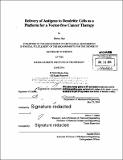Delivery of antigens to dendritic cells as a platform for a vector-free cancer therapy
Author(s)
Mao, Shirley
DownloadFull printable version (5.907Mb)
Other Contributors
Massachusetts Institute of Technology. Department of Mechanical Engineering.
Advisor
Klavs F. Jensen.
Terms of use
Metadata
Show full item recordAbstract
Cell based vaccines that activate a patient's immune system via an antigen-specific CD8 T cell response hold much therapeutic potential. One of the greatest challenges in the development of these vaccines is creating antigen presentation by delivery of antigens into the cell cytoplasm. It has been previously shown that a microfluidic chip developed at MIT is capable of intracellular delivery of macromolecules. We conducted a preliminary evaluation to determine whether an improved antigen-specific CD8 response can be achieved using the microfluidic squeezing platform. Using this approach, we delivered proteins and antigens to bone marrow derived dendritic cells (BMDCs) and splenic dendritic cells. We initially delivered fluorescent dyes to confirm that intracellular delivery could be achieved. Then ovalbumin (OVA) was delivered as a model protein to assess the system's capability to prime dendritic cells against a particular antigen. Dendritic cells activated post-delivery were then cultured with isolated primary T cells in-vitro to determine whether a T cell response could be induced by the treated dendritic cells. The efficacy of the microfluidic treatment was assessed by measuring T cell proliferation activated by T cell receptor (TCR) binding to MHC Class I receptors presented on the treated dendritic cells. After verification of the ovalbumin model, we propose to move to use B16F1O melanoma cell lysate as an antigenic source, a more clinically representative antigen source.
Description
Thesis: S.B., Massachusetts Institute of Technology, Department of Mechanical Engineering, 2014. Cataloged from PDF version of thesis. Includes bibliographical references (pages 45-46).
Date issued
2014Department
Massachusetts Institute of Technology. Department of Mechanical EngineeringPublisher
Massachusetts Institute of Technology
Keywords
Mechanical Engineering.